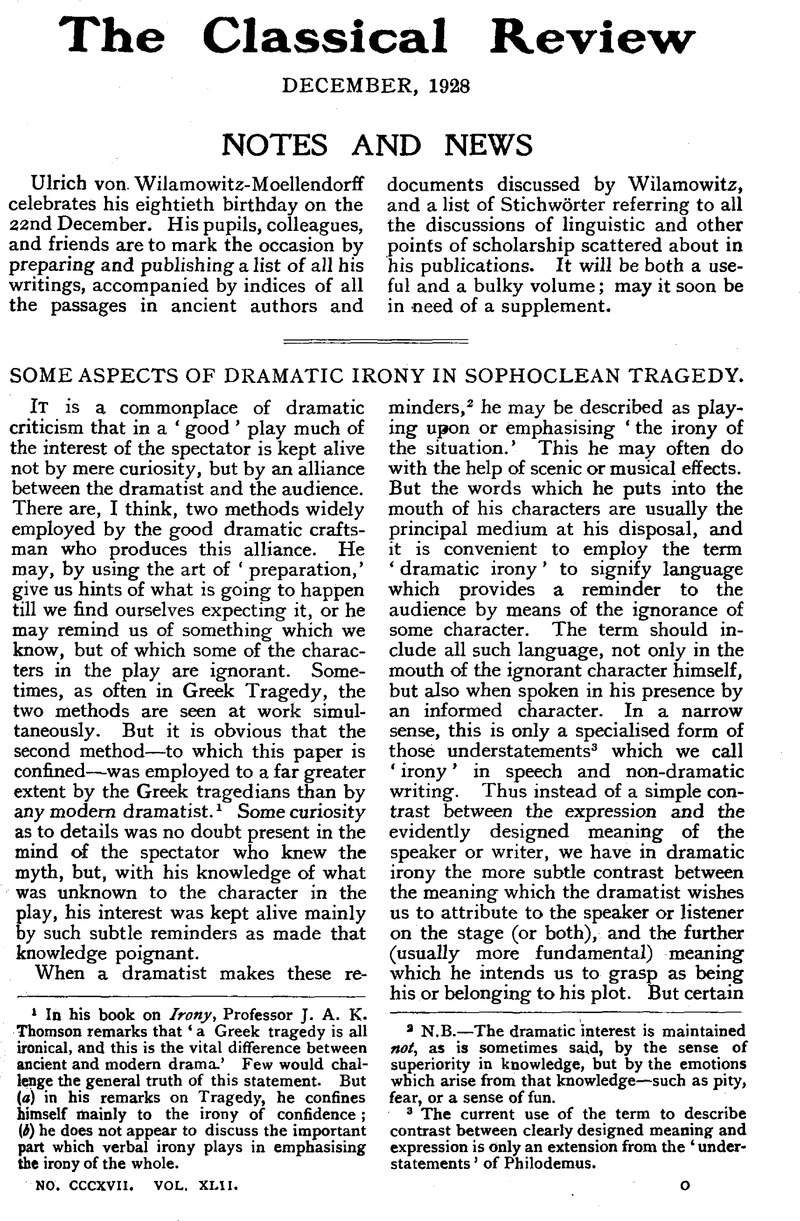Published online by Cambridge University Press: 27 October 2009

page 209 note 1 In his book on Irony, Professor J. A. K. Thomson remarks that ‘a Greek tragedy is all ironical, and this is the vital difference between ancient and modern drama.’ Few would challenge the general truth of this statement. But (a) in his remarks on Tragedy, he confines himself mainly to the irony of confidence ; (b) he does not appear to discuss the important part which verbal irony plays in emphasising the irony of the whole.
page 209 note 2 N.B.—The dramatic interest is maintained not, as is sometimes said, by the sense of superiority in knowledge, but by the emotions which arise from that knowledge—such as pity, fear, or a sense of fun.
page 209 note 3 The current use of the term to describe contrast between clearly designed meaning and expression is only an extension from the ‘under-statements’ of Philodemus.
page 210 note 1 When Fate is regarded as engineering or enjoying the contrasts in man's life, the phrase ‘Irony of Destiny’ is legitimate. It is questionable whether it is ever applicable altogether to Greek Tragedy.
page 210 note 2 Phil. 329.
page 210 note 3 Ibid., 528–9. Cf. 780–1 and C.R. XLII., P. 55.
page 211 note 1 Ag. 856–7.
page 211 note 2 Cf. e.g. O. T. 320, 329, 332, 1168; El. (soph.) 696–7, 799, 1451, 1455; Ajax 99, 686, 690; Phil. 812, Trach. 315, 329 ff. etc. In scenes conscious deception, language put into the mouth of the dissembler which gives the character to whom it is addressed the intended false impression, is ironic if it also reminds the audience of the truth. It may be language that is (a) true, but not true in the sense understood by the deceived, or (b) true in two senses, only one of them is understood by him. The preference for (b) is noticeable in Sophocles.
page 211 note 3 cf. e.g. Trach. 321 where Deianeira's ‘ironic’ interest in Iole is emphasised by the dramatic irony involved (ξνμρορ⋯ doublemeaning). Cf. also Trach. 85, 494: El. 773; Antig. 1051; Phil. 782, 907, etc. This use is however less distinctively Sophoclean than that described under (3) below.
page 211 note 4 Cf. e.g. El. 1456 ; Trach. 616–7; Ajax 96 ; Ant. 473–4, 760; O.T. 8, 244–5, 397. 626, etc.
page 212 note 1 Phil. 332 ff. (The irony is confirmed by N.'s comment in 339–40.)
page 212 note 2 Ibid., 254. (The irony of 258 assists the effect.)
page 212 note 3 Cf. the messenger's words in O.T. 937.
page 212 note 4 Elsewhere Aristotle used the term differently. But if the distinction is in itself important, it matters less how far A. felt it. Neither did he think it worth while to find a word for ‘irony’ in our sense, mainly, no doubt, because double-edged language was so natural to Greeks that no comment on its dramatic use seemed necessary.
page 212 note 5 Cf. Butcher, p. 323–4.
page 212 note 6 El. 1442 ff.; every word in the scene emphasises the irony of the whole.
page 212 note 7 Ib., 1468.
page 212 note 8 To make the irony complete, Aegisthus is encouraged by Orestes to lift the veil himself.
page 212 note 9 Ironical situations preceding a Peripeteia were not of course confined to Sophocles. But (a) S. made the most extensive use of verbal emphasis of them ; (b) the psychological variety was probably not found in Aeschylus (unless we are to count as such the desire to speak good omen, with the inevitable result that words of bad omen follow). As an example of verbal irony illustrating in Aeschylus the pre-Peripeteia situation, one may quote the famous prayer of Clyt. as Ag. goes into the palace. ‘Zeus, Zeus, accomplisher! Grant now my prayers. Hereafter as thou wilt mayest thou dispose.’ We know that this prayer by its accomplishment is to turn against her. Zeus will indeed dispose as he wills. Compare the effect of Clytemnestra's prayer in S. El. 644 ff.
page 213 note 1 Phil. 431.
page 213 note 2 These passages were discussed in C.R. XLII., p. 55.
page 213 note 3 O.T. 975.
page 213 note 4 If, as I believe, Mr. Sheppard is right in his interpretation of the Electra of Sophocles, then one might compare with this sort of irony the words of E. to A. (1457) : ‘Thou mayest rejoice, if this because for joy.’ Beneath the obvious irony of the words lies an expression of the undercurrent in E.'s mind—disgust at the work that the conspirators have to do. Comparable also are the words of Deianeira in Trach. 582–7. Even in her stupid confidence she has misgivings (revealed by the ironic implications of 11. 583 and 586).